5.5K
Downloads
54
Episodes
This is the official podcast of Geneva Peace Week, a leading annual forum in the international peacebuilding calendar. Subscribe now for a library of content about peacebuilding and rebuilding trust after disruption, and don’t forget to tune into Geneva Peace Week at genevapeaceweek.ch.
Episodes
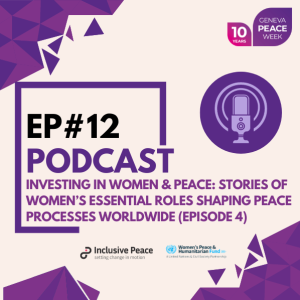
Sunday Oct 22, 2023
Sunday Oct 22, 2023
Episode 4 features Hilda Issa from Palestine and Concy Louis from South Sudan. They discuss the importance of and challenges to young women’s inclusion in peace processes.
Almost 25 years after the adoption of UNSCR 1325, women continue to face exclusion from and marginalisation in peace processes. This five-part podcast series features reflections from women peacebuilders around the world on their experiences of women's participation in peace processes, the various challenges they encounter, and strategies they have employed to amplify their voices and influence. Discussion topics across all episodes draw on the thematic foci of the 2023 Berlin Declaration and include, inter alia, women's access to the necessary financial means to meaningfully participate, their protection, and the role of women's (solidarity) movements in enhancing their participation and influence in peace processes. Each episode involves conversations with women peacebuilders.
Podcast by inclusive Peace: https://www.inclusivepeace.org/ and Women’s Peace and Humanitarian Fund: https://wphfund.org/
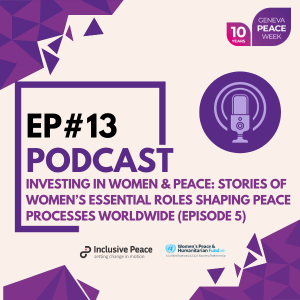
Sunday Oct 22, 2023
Sunday Oct 22, 2023
Episode 5 features Natalia Brandler from Venezuela and Sartu Shemsuddin from Ethiopia. They exchange on the challenges and opportunities for women’s participation in national dialogues, focusing particularly on the role and situation of women’s civil society organisations.
Almost 25 years after the adoption of UNSCR 1325, women continue to face exclusion from and marginalisation in peace processes. This five-part podcast series features reflections from women peacebuilders around the world on their experiences of women's participation in peace processes, the various challenges they encounter, and strategies they have employed to amplify their voices and influence. Discussion topics across all episodes draw on the thematic foci of the 2023 Berlin Declaration and include, inter alia, women's access to the necessary financial means to meaningfully participate, their protection, and the role of women's (solidarity) movements in enhancing their participation and influence in peace processes. Each episode involves conversations with women peacebuilders.
Podcast by inclusive Peace: https://www.inclusivepeace.org/ and Women’s Peace and Humanitarian Fund: https://wphfund.org/
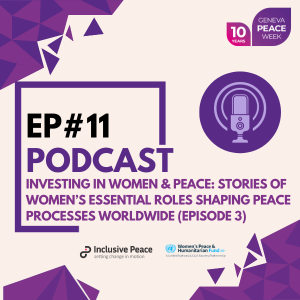
Sunday Oct 22, 2023
Sunday Oct 22, 2023
Episode 3 features Salwa Elsdaik from Sudan and Vimbai Kapurura from Eswatini who discuss the linkages between participation and protection of women peacebuilders in contexts where protection needs recently have become more acute.
Almost 25 years after the adoption of UNSCR 1325, women continue to face exclusion from and marginalisation in peace processes. This five-part podcast series features reflections from women peacebuilders around the world on their experiences of women's participation in peace processes, the various challenges they encounter, and strategies they have employed to amplify their voices and influence. Discussion topics across all episodes draw on the thematic foci of the 2023 Berlin Declaration and include, inter alia, women's access to the necessary financial means to meaningfully participate, their protection, and the role of women's (solidarity) movements in enhancing their participation and influence in peace processes. Each episode involves conversations with women peacebuilders.
Podcast by inclusive Peace: https://www.inclusivepeace.org/ and Women’s Peace and Humanitarian Fund: https://wphfund.org/
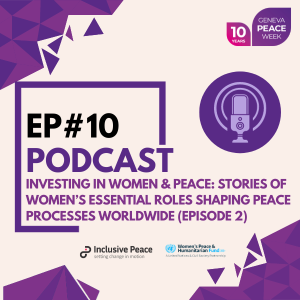
Sunday Oct 22, 2023
Sunday Oct 22, 2023
Episode 2 is moderated by Breifni Flanagan from the Women’s Peace & Humanitarian Fund (WPHF), she is joined by Sophie Giscard d'Estaing, Program Coordinator at Women’s Peace & Humanitarian Fund (WPHF) and they discuss how current trends in peace processes affect the work of the Women’s Peace & Humanitarian Fund (WPHF) and provide examples of women’s initiatives that the Rapid Response Window has supported more recently.
Almost 25 years after the adoption of UNSCR 1325, women continue to face exclusion from and marginalisation in peace processes. This four-part podcast series features reflections from women peacebuilders around the world on their experiences of women's participation in peace processes, the various challenges they encounter, and strategies they have embraced to amplify their voice and influence. Discussion topics across all episodes draw on the thematic foci of the 2023 Berlin Declaration and include, inter alia, women's access to the necessary financial means to meaningfully participate, their protection, and the role of women's (solidarity) movements in enhancing their participation and influence in peace processes.
Podcast by inclusive Peace: https://www.inclusivepeace.org/ and Women’s Peace and Humanitarian Fund: https://wphfund.org/
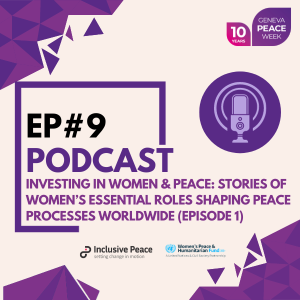
Sunday Oct 22, 2023
Sunday Oct 22, 2023
Episode 1 features Thania Paffenholz, Executive Director of Inclusive Peace, and sets the stage for the series, describing the changing nature of formal peace processes as well as recent trends in women's participation therein.
Almost 25 years after the adoption of UNSCR 1325, women continue to face exclusion from and marginalisation in peace processes. This four-part podcast series features reflections from women peacebuilders around the world on their experiences of women's participation in peace processes, the various challenges they encounter, and strategies they have embraced to amplify their voice and influence. Discussion topics across all episodes draw on the thematic foci of the 2023 Berlin Declaration and include, inter alia, women's access to the necessary financial means to meaningfully participate, their protection, and the role of women's (solidarity) movements in enhancing their participation and influence in peace processes.
Podcast by inclusive Peace: https://www.inclusivepeace.org/ and Women’s Peace and Humanitarian Fund: https://wphfund.org/
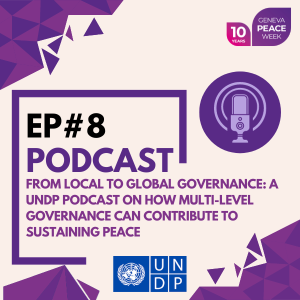
Friday Oct 13, 2023
Friday Oct 13, 2023
The podcast will allow UNDP to showcase perspectives and conclusions from fresh research on the role of multi-level governance in sustaining peace in fragile and conflict-affected settings, bringing together selected experts in the field.
The discussion will emphasize definitions, demands and tools for strengthening multi-level governance in fragile and conflict-affected settings. In line with the overall theme, this will address challenges at different levels of governance from the global to the local. The podcast will highlight the potential of multi-level governance to strengthen people-centered recovery that addresses grievances, including those at the heart of conflict. The purpose is to demonstrate approaches and tools that hold potential to enhance legitimacy and trust in State-society relations, ultimately contributing to peacebuilding and increased stability.
Specifically, the podcast will share the lessons learnt from a review of multi-level governance in different country settings, conducted by UNDP and University of Melbourne researchers.
The podcast will also showcase UNDP’s new hands-on multi-level governance toolkit (forthcoming, 2023), developed by UNDP and the German Social Innovation Agency Minds & Makers, which is inspired by design thinking principles and targets peacebuilding and development practitioners engaged in country-level programming.
These new products will be complemented by perspectives from other partners as well as lessons from multi-level governance programming in fragile and crisis-affected countries.
Listeners are encouraged to reflect on and respond to questions arising from the podcast and engage in a discussion with other listeners. Please share your thoughts, ideas and questions on UNDP’s discussion page!
Some questions you might want to reflect on are:
- What are your suggestions for making multi-level governance more effective?
- Do you have any examples where multi-level governance contributed to crisis management, peacebuilding and recovery?
- How do governance institutions at different levels collaborate with each other in your country?
Podcast by the United Nations Development Programme (UNDP) : https://www.undp.org/

Friday Oct 13, 2023
Frontline Negotiators: Stories from the Field
Friday Oct 13, 2023
Friday Oct 13, 2023
Every day, humanitarian workers negotiate with different counterparts – from armed groups to government authorities, and from religious leaders to displaced communities – to deliver aid in crisis situations. To negotiate successfully, these professionals need to carefully analyse the situation, create a strategic plan, and manage very high pressure.
The podcast series “Frontline Negotiators: Stories from the Field” guides you through personal stories told by humanitarian professionals who negotiate to access, assist and protect people in crisis.
The series is produced by the Centre of Competence on Humanitarian Negotiation – a shared initiative of the International Committee of the Red Cross, Médecins Sans Frontières Switzerland, the UN High Commissioner for Refugees, and the UN World Food Programme.
For more information, visit frontline-negotiations.org/podcast.
New episodes are released biweekly until December 2023.
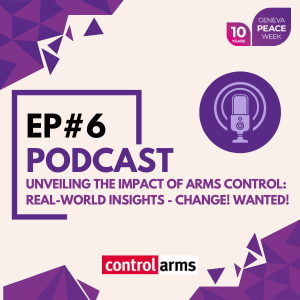
Monday Oct 09, 2023
Monday Oct 09, 2023
Multilateral arms control agreements face a credibility crisis, marked by declining transparency and inconsistent enforcement. Many States Parties now opt for private reports under the Arms Trade Treaty (ATT), reducing public accountability. Non-compliance often goes unaddressed. However, the true measure of these agreements should be their impact on communities affected by firearm violence and the trust they foster.
Campaigners striving to prevent gun violence have limited participation opportunities in multilateral forums, where top-down approaches prevail. This podcast aims to amplify the voices of these campaigners, offering their perspectives on the impact of arms control agreements.
Podcast by Control Arms: https://controlarms.org/
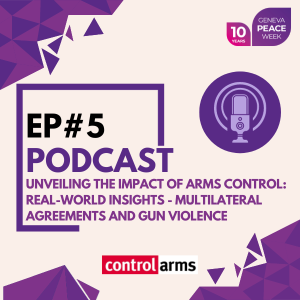
Monday Oct 09, 2023
Monday Oct 09, 2023
Multilateral arms control agreements face a credibility crisis, marked by declining transparency and inconsistent enforcement. Many States Parties now opt for private reports under the Arms Trade Treaty (ATT), reducing public accountability. Non-compliance often goes unaddressed. However, the true measure of these agreements should be their impact on communities affected by firearm violence and the trust they foster.
Campaigners striving to prevent gun violence have limited participation opportunities in multilateral forums, where top-down approaches prevail. This podcast aims to amplify the voices of these campaigners, offering their perspectives on the impact of arms control agreements.
Podcast by Control Arms: https://controlarms.org/
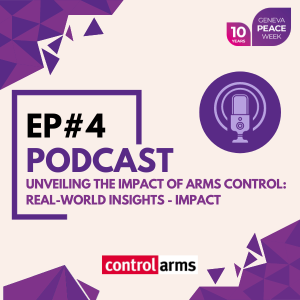
Monday Oct 09, 2023
Monday Oct 09, 2023
Multilateral arms control agreements face a credibility crisis, marked by declining transparency and inconsistent enforcement. Many States Parties now opt for private reports under the Arms Trade Treaty (ATT), reducing public accountability. Non-compliance often goes unaddressed. However, the true measure of these agreements should be their impact on communities affected by firearm violence and the trust they foster.
Campaigners striving to prevent gun violence have limited participation opportunities in multilateral forums, where top-down approaches prevail. This podcast aims to amplify the voices of these campaigners, offering their perspectives on the impact of arms control agreements.
Podcast by Control Arms: https://controlarms.org/
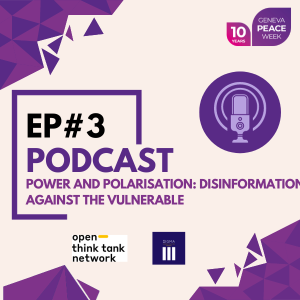
Monday Oct 09, 2023
Power and Polarisation: Disinformation Against the Vulnerable (episode 3)
Monday Oct 09, 2023
Monday Oct 09, 2023
Disinformation isn't just false or misconstrued information, but rather a concrete strategy to establish influence and enhance polarisation by targeting specific socio-economic, identity and gender groups.
In this respect, Sigma European Think Tank has produced a podcast series in which the context, procedure and potential consequences for disinformation towards vulnerable groups are discussed. More specifically, the goal of this podcast is to show how targets are selected and for what reason, how it is used to discourage a constructive debate, and the potentials it has to topple peace-building efforts between political groups, nations, and different identity groupings.
Next to our speakers Chris Kremidas-Courtney, Luisa Bunescu and Maximilan Rau, we have also interviewed non-experts to add how they perceive disinformation.
We look forward to giving the audience a deeper understanding of the subject matter, raise awareness and allow for a new appreciation for the complex structures and spin-doctoring of content.
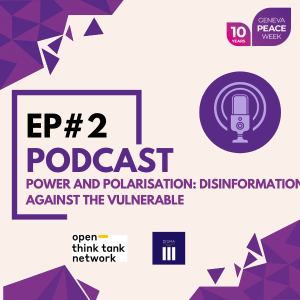
Monday Oct 09, 2023
Power and Polarisation: Disinformation Against the Vulnerable (episode 2)
Monday Oct 09, 2023
Monday Oct 09, 2023
Disinformation isn't just false or misconstrued information, but rather a concrete strategy to establish influence and enhance polarisation by targeting specific socio-economic, identity and gender groups.
In this respect, Sigma European Think Tank has produced a podcast series in which the context, procedure and potential consequences for disinformation towards vulnerable groups are discussed. More specifically, the goal of this podcast is to show how targets are selected and for what reason, how it is used to discourage a constructive debate, and the potentials it has to topple peace-building efforts between political groups, nations, and different identity groupings.
Next to our speakers Chris Kremidas-Courtney, Luisa Bunescu and Maximilan Rau, we have also interviewed non-experts to add how they perceive disinformation.
We look forward to giving the audience a deeper understanding of the subject matter, raise awareness and allow for a new appreciation for the complex structures and spin-doctoring of content.
Podcast by Sigma European Think-Tank: https://www.think-sigma.eu/
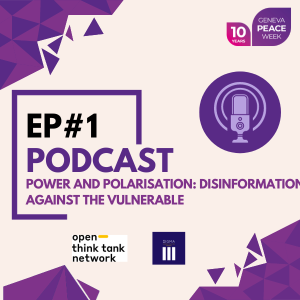
Monday Oct 09, 2023
Power and Polarisation: Disinformation Against the Vulnerable (episode 1)
Monday Oct 09, 2023
Monday Oct 09, 2023
Disinformation isn't just false or misconstrued information, but rather a concrete strategy to establish influence and enhance polarisation by targeting specific socio-economic, identity and gender groups.
In this respect, Sigma European Think Tank has produced a podcast series in which the context, procedure and potential consequences for disinformation towards vulnerable groups are discussed. More specifically, the goal of this podcast is to show how targets are selected and for what reason, how it is used to discourage a constructive debate, and the potentials it has to topple peace-building efforts between political groups, nations, and different identity groupings.
Next to our speakers Chris Kremidas-Courtney, Luisa Bunescu and Maximilan Rau, we have also interviewed non-experts to add how they perceive disinformation.
We look forward to giving the audience a deeper understanding of the subject matter, raise awareness and allow for a new appreciation for the complex structures and spin-doctoring of content.
Podcast by Sigma European Think-Tank: https://www.think-sigma.eu/
Friday Nov 04, 2022
Friday Oct 21, 2022
Accomodating cultural diversity: Key to successful peace accords
Friday Oct 21, 2022
Friday Oct 21, 2022
By the University of Birmingham, the Royal United Services Institute, the University of Geneva
Our podcast and associated activities reflect on the role of cultural reforms in peace agreements and open a broad conversation on how cultural institutions can be reformed to nurture sustainable peace after civil wars. In the podcast, we present our recent work, which explores how all intra-state peace accords concluded worldwide in 1989-2017 reformed cultural institutions. We found that cultural reforms which accommodate cultural diversity in intra-state peace accords makes them more successful and resilient. We explain why this may be the case through examples from conflict-affected societies such as Northern Ireland.
Tuesday Oct 18, 2022
Tuesday Oct 18, 2022
By FAO, CIGAR, The Geneva Graduate Institute, Interpeace, WFP, and the Geneva Water Hub
The climate crisis is significantly transforming the global peace and security landscape by exacerbating the social, economic and political processes that can lead to instability and conflict. These effects are particularly evident in fragile and conflict-affected countries that are highly dependent on a climate-sensitive agricultural sector. In these settings, climate-change induced pressure on local food systems can lead to food shortages and acute food insecurity, even famine, which have been identified as a key pathway through which climate change can cause conflict, especially at the local level. This situation has led to the emergence of a new area within the security sector, climate security, which refers to conflict and security risks induced, directly or indirectly, by climate variability. Within this broader area, food security plays a prominent role: more than 26% of all damages and losses caused by medium- and large-scale climate-related disasters are absorbed by the agricultural sector. In addition, food security interventions and natural resource management has also been identified as an opportunity that can be used to both build peace and adapt to climate change.
This podcast aims at increasing understanding of how agriculture and food systems are linked to climate and conflict dynamics and explores pathways through which food security and agricultural interventions can support the dual processes of building resilience to climate change and sustaining peace. It brings together the expertise and experience of interdisciplinary actors from across international Geneva, and from around the world, to examine both promising past interventions and consider lessons for the future.
Tuesday Oct 18, 2022
#BulletAndDove: When women are at tables, peace is long lasting
Tuesday Oct 18, 2022
Tuesday Oct 18, 2022
By World WYCA
The World YWCA, in collaboration with Geneva Peace Week 2022, bring you a conversation on the role that women and cross-regional solidarity play in the peace processes. The World YWCA is a grassroots, feminist, community-driven movement that has worked tirelessly for the past 167 years to make the world a safer and more just place for women and young women and girls globally.
Over the years the YWCA movement has signed more than 40 resolutions aimed at peace and justice, contributing massively to the UNSCR1325. A key piece of this work lies in the support that YWCA organizations give one another as they advocate for women at peace tables. By understanding that global systems of oppression and conflict are interlocked, partnerships such as that between YWCA Palestine and YWCA Japan are formed, where learnings, support and solidarity informs peace processes.
To learn more about this seemingly unlikely coalition, we have Amal Tarazi from Palestine and Sumie Ogasawara from Japan tell us more about their experiences in practices of cross-regional solidarity, debunking assumptions about conflict being a fact we should not question, and the uniquely indisputable role women play in the fight
for peace with justice under the #BulletAndDove concept.
Tuesday Oct 18, 2022
The missing peace: Business as the change for good
Tuesday Oct 18, 2022
Tuesday Oct 18, 2022
By Business Plan for Peace, Conscious Togetherness, and H&M
We can break down silos between the peacebuilding and private sector and contribute to the overall goal that "Peace is Everybody's Business".
In this podcast for the GPW2022, Dr Scilla Elworthy (the business plan for Peace) and Geli Gallanz of H&M, share insights and examples of new and fresh ways of big brands and peacebuilding organisations can work together for change at both the local and global levels. Based on personal experience, they are inspiring how to go beyond the theoretical perspective into reality.
Podcasthost:
Nienke van Bezooijen
Interviewees:
1. Dr Scilla Elworthy, founder of Peace Direct, the Businessplan for Peace and the Mighty Heart. Three times nominee for the Nobel Peace Price. 4 decades peace builder.
2. Angela Gallanz (Geli) HR manager for H&M western Europe
Sunday Oct 31, 2021
Geneva Peace-Cast: Digitizing actions for peace
Sunday Oct 31, 2021
Sunday Oct 31, 2021
Geneva Peace-Cast is a new series highlighting solutions emerging from Geneva Peace Week, produced by Interpeace and Fondation Hirondelle in coordination with Geneva Peacebuilding Platform. This podcast is launched on the occasion of Geneva Peace Week’s 2021 edition, happening live at Maison de la Paix and online from November 1 to Nov.5.
Episode 2:
Gbenga Sesan, Executive Director of Paradigm Initiative, social enterprise focused on digital inclusion and digital rights operating across several African countries, interviewed by Jacqueline Dalton, on the use of digital tools for non-violent purposes.
Sunday Oct 31, 2021
Geneva Peace-Cast: Governing institutions for sustainable peace
Sunday Oct 31, 2021
Sunday Oct 31, 2021
Geneva Peace-Cast is a new series highlighting solutions emerging from Geneva Peace Week, produced by Interpeace and Fondation Hirondelle in coordination with Geneva Peacebuilding Platform. This podcast is launched on the occasion of Geneva Peace Week’s 2021 edition, happening live at Maison de la Paix and online from November 1 to Nov.5.
Episode 3:
General Roméo Dallaire, member of the International Commission on Inclusive Peace, former Canadian Senator and founder of the Dallaire Institute for Children, Peace, and Security, and Bernardo Arévalo de León, member of the Guatemalan Congress, senior diplomat and member of the International Commission on Inclusive Peace of the P4P initiative, interviewed by Luvini Ranasinghe, on the role of governing institutions in building sustainable peace.
